
Casual Connect is one of the most interesting conferences in video games now because the social and mobile game companies have crashed the party and completely turned the casual game industry — which was previously selling $20 games on web sites to old ladies — on its head. Now the Seattle show, which concluded today, is filled with talk about DAUs (daily active users, a measure of how often users return to a game), and retention.
In the tawdriest publicity stunt of the show, Hi5 president Alex St. John symbolically took on the much larger social network Facebook, as represented here by a 350-pound sumo wrestler. St. John says Hi5 will be kind to game developers, who are, he says, suffering under the terrible weight of Facebook’s greed. St. John managed to throw the sumo wrestler once, but St. John got thrown twice and was aching the next day.
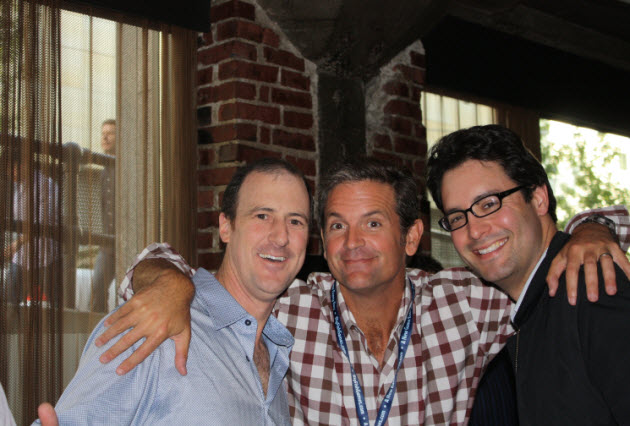 Playdom chief executive John Pleasants (center) and his Playdom buddies may have plenty to smile about, if the rumors that Disney is making a run at the company are true. Disney and Playdom have not commented. For two years running, Playdom has thrown a big party at Casual Connect in the hope of recruiting talent. Pleasants of course was offering to buy the company of any developer that attended his party. Is it my imagination or is Pleasants growing mouse ears?
Playdom chief executive John Pleasants (center) and his Playdom buddies may have plenty to smile about, if the rumors that Disney is making a run at the company are true. Disney and Playdom have not commented. For two years running, Playdom has thrown a big party at Casual Connect in the hope of recruiting talent. Pleasants of course was offering to buy the company of any developer that attended his party. Is it my imagination or is Pleasants growing mouse ears?
 Samsung Mobile threw a soiree at the Seattle Art Museum, across the street from the now shut-down Lusty Lady peep show, where they had witty billboards with double entendres for years.
Samsung Mobile threw a soiree at the Seattle Art Museum, across the street from the now shut-down Lusty Lady peep show, where they had witty billboards with double entendres for years.
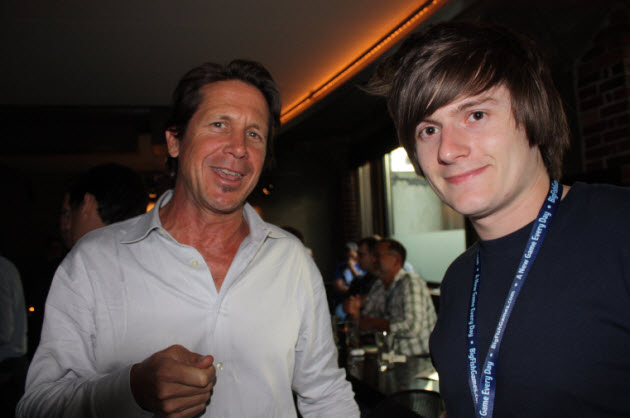 Randy Breen, chief executive of SGN, a pioneering iPhone game company, was in town for the show. Last year, iPhone was all the rage at Casual Connect. But Facebook has taken off in a big way, though the iPhone game developers are starting to crack smiles because the iPhone is taking off too. SGN recently launched its first cross-platform Android-iPhone mobile game. If there was a hot thing on the horizon for mobile games, it was Android. On the right is Jude Gomilla, co-founder of Heyzap, which announced at the show it can stick a full-fledged game arcade in just about any web site. Sorry guys, but you’ll probably have to wait until next year till Disney buys your company for $600 million.
Randy Breen, chief executive of SGN, a pioneering iPhone game company, was in town for the show. Last year, iPhone was all the rage at Casual Connect. But Facebook has taken off in a big way, though the iPhone game developers are starting to crack smiles because the iPhone is taking off too. SGN recently launched its first cross-platform Android-iPhone mobile game. If there was a hot thing on the horizon for mobile games, it was Android. On the right is Jude Gomilla, co-founder of Heyzap, which announced at the show it can stick a full-fledged game arcade in just about any web site. Sorry guys, but you’ll probably have to wait until next year till Disney buys your company for $600 million.
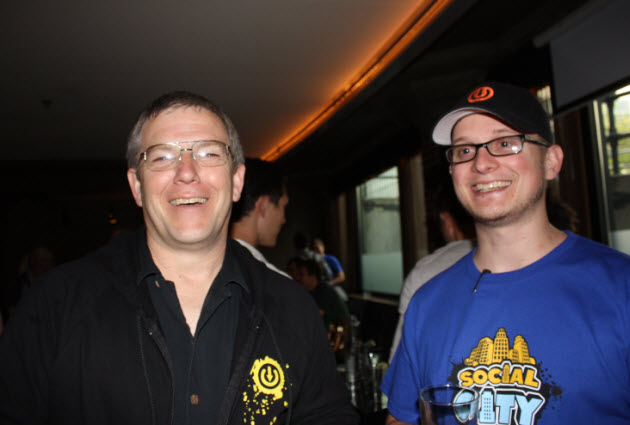
AI Weekly
The must-read newsletter for AI and Big Data industry written by Khari Johnson, Kyle Wiggers, and Seth Colaner.
Included with VentureBeat Insider and VentureBeat VIP memberships.
Jeff Tunnell (left) and his son (actually, not pictured at right) are indie developers at PushButtonLabs in Eugene, Ore. This father-son team was part of the crew that developed Social City, which is Playdom’s biggest hit.
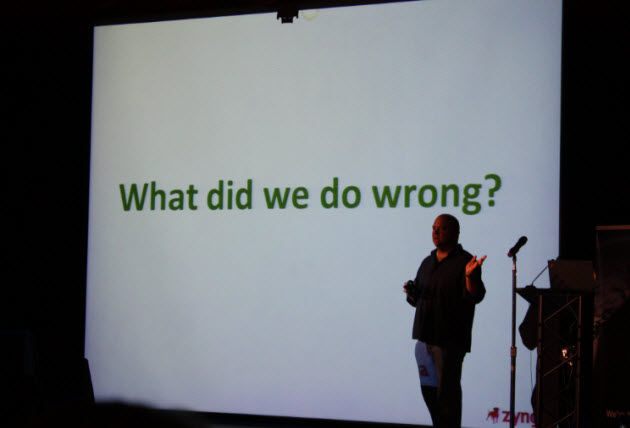 Eric Bethke, director of product at Zynga, got up on stage to bravely talk about how not to do a social game. He created GoPets, but found that sophisticated 3D graphics animated characters delivered on web sites were just not what the market wanted. But don’t feel sorry for Bethke; he’s now working on Mafia Wars, one of Zynga’s longest-running games with more than 17.9 million monthly active users. Interesting anecdote: Bethke believed so much in GoPets, he moved to South Korea. There, he found there were laws against firing people. Instead of doing that, he was advised, you just had to publicly shame them in front of all of the employees until they would quit on their own. It may sound cruel, but it’s kinder than the Mafia way.
Eric Bethke, director of product at Zynga, got up on stage to bravely talk about how not to do a social game. He created GoPets, but found that sophisticated 3D graphics animated characters delivered on web sites were just not what the market wanted. But don’t feel sorry for Bethke; he’s now working on Mafia Wars, one of Zynga’s longest-running games with more than 17.9 million monthly active users. Interesting anecdote: Bethke believed so much in GoPets, he moved to South Korea. There, he found there were laws against firing people. Instead of doing that, he was advised, you just had to publicly shame them in front of all of the employees until they would quit on their own. It may sound cruel, but it’s kinder than the Mafia way.
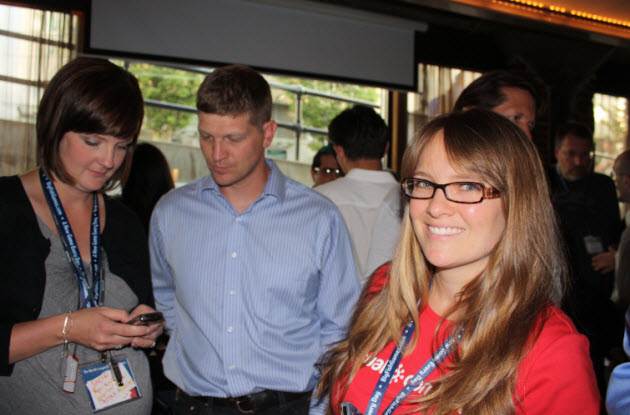 Jessica Tams, managing director of the Casual Games Association, which puts on Casual Connect, is smiling because attendance was 2,000, up 15 percent from a year ago.
Jessica Tams, managing director of the Casual Games Association, which puts on Casual Connect, is smiling because attendance was 2,000, up 15 percent from a year ago.
 Casual games are a family affair at Arkadium. The New York-based company, which has more than 300 games and is making the shift to Facebook, was founded by a husband-and-wife team. Kenny Rosenblatt is chief executive, and Jessica Rovella is president. Ask them about how they balance work and life.
Casual games are a family affair at Arkadium. The New York-based company, which has more than 300 games and is making the shift to Facebook, was founded by a husband-and-wife team. Kenny Rosenblatt is chief executive, and Jessica Rovella is president. Ask them about how they balance work and life.
 Dave Roberts, chief executive of PopCap Games, leads one of the most successful indie developers in history. The company has made hit games from Bejeweled to Zuma to my kids’ favorite, Plants vs. Zombies. He admitted that he had Zombie brains when it came to publishing Plants vs. Zombies. Roberts recommended that his team of four people, which worked on the game for three years, should ship it at the two-year point. He admits now that the game needed the extra year of polishing and that it turned out much better; hence, his developers were right to take a third year making the game. But he’s laughing his way to the bank. The company was showing off a Facebook version of Zuma.
Dave Roberts, chief executive of PopCap Games, leads one of the most successful indie developers in history. The company has made hit games from Bejeweled to Zuma to my kids’ favorite, Plants vs. Zombies. He admitted that he had Zombie brains when it came to publishing Plants vs. Zombies. Roberts recommended that his team of four people, which worked on the game for three years, should ship it at the two-year point. He admits now that the game needed the extra year of polishing and that it turned out much better; hence, his developers were right to take a third year making the game. But he’s laughing his way to the bank. The company was showing off a Facebook version of Zuma.
 As you can see from the expression on Alex St. John’s face during the wrestling match, he really did want to throw the 350-pound sumo wrestler. St. John had to shave all his body hair before the fight. Sorry, too much information.
As you can see from the expression on Alex St. John’s face during the wrestling match, he really did want to throw the 350-pound sumo wrestler. St. John had to shave all his body hair before the fight. Sorry, too much information.
 Mari Baker, chief executive of PlayFirst, is one of the few women CEOs in the casual game industry, which makes games that are primarily enjoyed by women. She mentioned that one of her seasoned male game developers got in touch with his inner female by hanging out at a hospital maternity ward and talking with new mothers. It seems to work, as the company’s hit title, Diner Dash, has sold more than 500 million downloads.
Mari Baker, chief executive of PlayFirst, is one of the few women CEOs in the casual game industry, which makes games that are primarily enjoyed by women. She mentioned that one of her seasoned male game developers got in touch with his inner female by hanging out at a hospital maternity ward and talking with new mothers. It seems to work, as the company’s hit title, Diner Dash, has sold more than 500 million downloads.
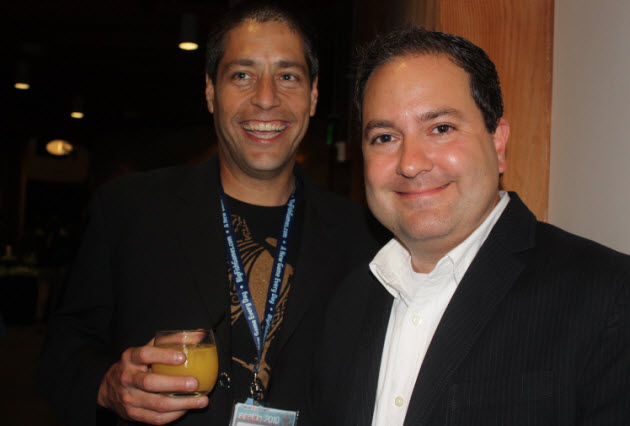 Martin Mueller from Mixamo is always smiling. Andrew Schneider, right, was smiling at the Seattle Aquarium party because his company, Live Gamer, announced two deals during the week. Live Gamer is providing its virtual goods platform to both THQ and Real Networks. That’s a validation of the virtual goods model by two of the industry’s biggest companies.
Martin Mueller from Mixamo is always smiling. Andrew Schneider, right, was smiling at the Seattle Aquarium party because his company, Live Gamer, announced two deals during the week. Live Gamer is providing its virtual goods platform to both THQ and Real Networks. That’s a validation of the virtual goods model by two of the industry’s biggest companies.
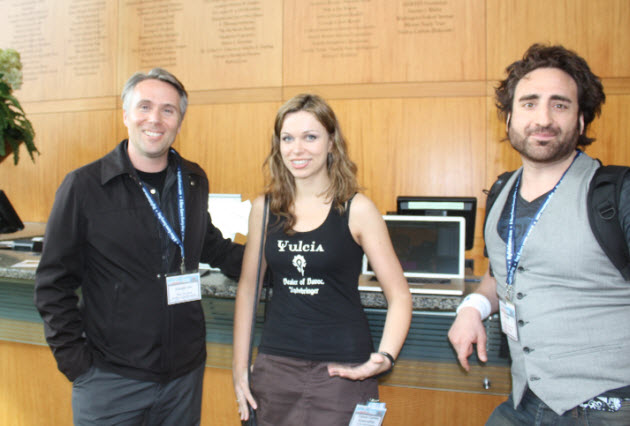 Mark DeLoura, the games evangelist of Google (left), came with fellow Googler Michael Mahemoff to evangelize the masses about Google’s great online stores and the Android operating system. Yulia Vakhrusheva of the Casual Games Association is in the center, and she happily put up the signs leading to the Google indoctrination session. I asked DeLoura if he would talk about the upcoming rumored Google Social Network, but he smartly delivered a “no comment.”
Mark DeLoura, the games evangelist of Google (left), came with fellow Googler Michael Mahemoff to evangelize the masses about Google’s great online stores and the Android operating system. Yulia Vakhrusheva of the Casual Games Association is in the center, and she happily put up the signs leading to the Google indoctrination session. I asked DeLoura if he would talk about the upcoming rumored Google Social Network, but he smartly delivered a “no comment.”
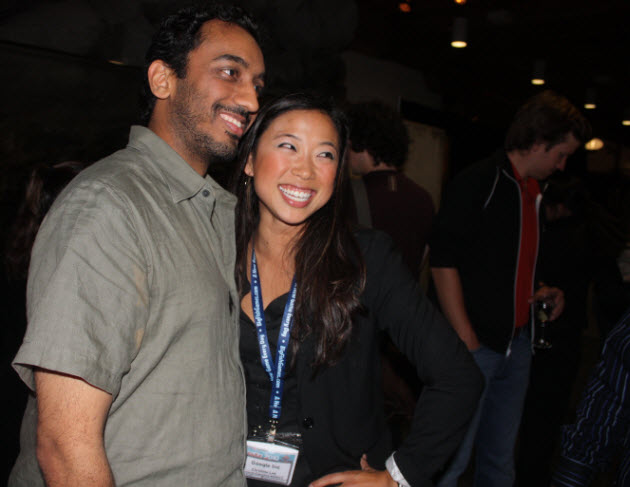
Rave Mehta, chief executive of Helios Interactive, has launched the GameCore 3D cross-platform game development platform. It is potentially disruptive because it lets developers create games that run on multiple platforms. The company’s server platform also allows gamers to play each other across platforms. But Christine Lee, formerly of AdMob and now at Google, has a bigger smile because Google bought AdMob for $750 million.
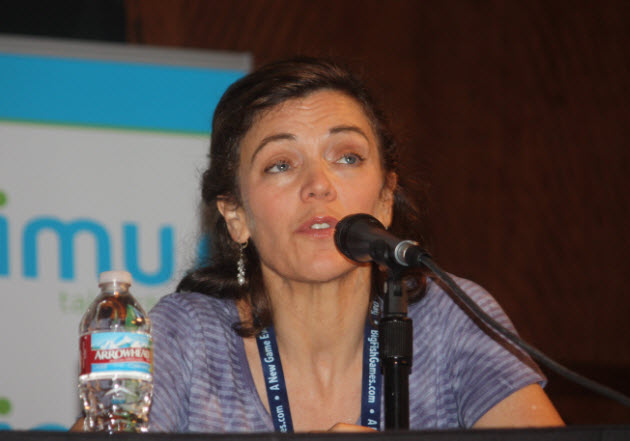 Amy Jo Kim, a multidisciplinary game designer, is one of the big proponents of “gamification,” which she also calls “metagaming.” That means the layering of game-like rewards on top of existing activities, from learning to dieting. She notes that game designers shouldn’t confuse virtual currency — which is money that can go up or down — with virtual experience points, which usually only go up. There are also skill points and social points that figure in rewarding gamers.
Amy Jo Kim, a multidisciplinary game designer, is one of the big proponents of “gamification,” which she also calls “metagaming.” That means the layering of game-like rewards on top of existing activities, from learning to dieting. She notes that game designers shouldn’t confuse virtual currency — which is money that can go up or down — with virtual experience points, which usually only go up. There are also skill points and social points that figure in rewarding gamers.
 Susan Wu, chief executive of Ohai, talked about the experience of making the City of Eternals vampire game, which hasn’t been a gigantic hit on Facebook but broke important ground as a synchronous (with real-time movement) title. She took the lid off of a new project, dubbed Project Unicorn Parade, a cute animal game that is Ohai’s next game.
Susan Wu, chief executive of Ohai, talked about the experience of making the City of Eternals vampire game, which hasn’t been a gigantic hit on Facebook but broke important ground as a synchronous (with real-time movement) title. She took the lid off of a new project, dubbed Project Unicorn Parade, a cute animal game that is Ohai’s next game.
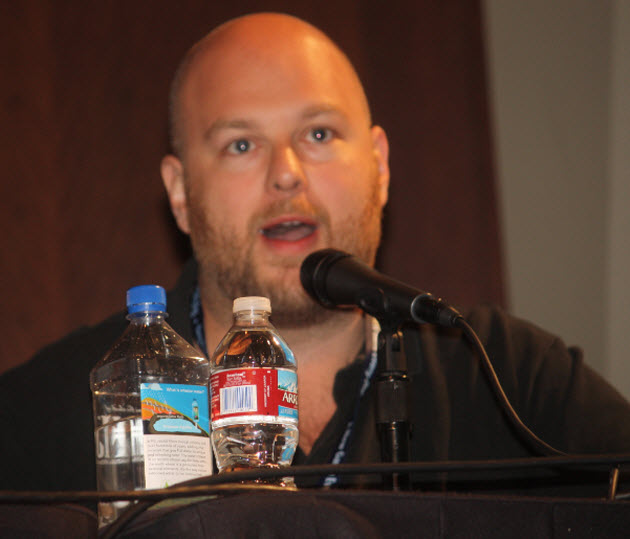 Gabe Zichermann is the author of Game-Based Marketing, a title about gamification of everything from frequent flyer programs to Foursquare, the location-based phenomenon. Zichermann says that those who want to gamify their activities should keep it simple, implementing reward systems such as badges. HIs other advise is to offer rewards as often as you can and don’t negatively incent players.
Gabe Zichermann is the author of Game-Based Marketing, a title about gamification of everything from frequent flyer programs to Foursquare, the location-based phenomenon. Zichermann says that those who want to gamify their activities should keep it simple, implementing reward systems such as badges. HIs other advise is to offer rewards as often as you can and don’t negatively incent players.
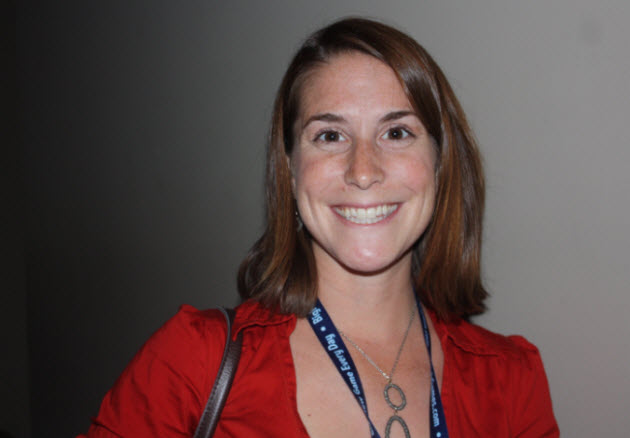 Shanna Tellerman is a triathlete and has a grad degree from Carnegie Mellon. While there, she led a team that built a free, crowdsourced 3D game creation platform with an integrated community for game developers. Now she’s commercializing the technology as chief executive of Wild Pockets. Her goal is to democratize game development, even to the point where normal folks and not geeks can make games. It’s another stab at user-generated content, much as YouTube did for video. She was part of a panel I moderated on next-generation platforms.
Shanna Tellerman is a triathlete and has a grad degree from Carnegie Mellon. While there, she led a team that built a free, crowdsourced 3D game creation platform with an integrated community for game developers. Now she’s commercializing the technology as chief executive of Wild Pockets. Her goal is to democratize game development, even to the point where normal folks and not geeks can make games. It’s another stab at user-generated content, much as YouTube did for video. She was part of a panel I moderated on next-generation platforms.
 Tim Chang, principal at Norwest Venture Partners, gave a talk on the trends of casual and social game industries. In doing research on the topic, he’s become something of a behavioral psychologist, trying to understand what appeals to people who are hopelessly addicted to certain games. He’s a big believer in gamification, and he worries that the virality is slipping out of Facebook games, ever since Facebook cracked down on viral messages. But there could be big trends coming in augmented reality, location-based games, new genres for social such as turn-based strategy games, and even dark or edgy content that the big brands will stay away from.
Tim Chang, principal at Norwest Venture Partners, gave a talk on the trends of casual and social game industries. In doing research on the topic, he’s become something of a behavioral psychologist, trying to understand what appeals to people who are hopelessly addicted to certain games. He’s a big believer in gamification, and he worries that the virality is slipping out of Facebook games, ever since Facebook cracked down on viral messages. But there could be big trends coming in augmented reality, location-based games, new genres for social such as turn-based strategy games, and even dark or edgy content that the big brands will stay away from.
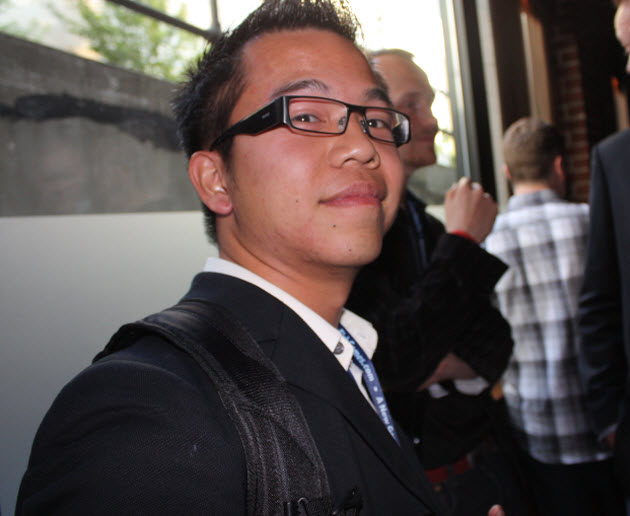 Albert Lai, a Facebook analytics expert and CEO at Kontagent, declared that virality (spreading games fast by word of mouth) is dead on Facebook. Now game publishers have to work harder to get hits to spread on the platform.
Albert Lai, a Facebook analytics expert and CEO at Kontagent, declared that virality (spreading games fast by word of mouth) is dead on Facebook. Now game publishers have to work harder to get hits to spread on the platform.
 Jason Kapalka, co-founder of PopCap Games and an advocate of high-quality casual games, is here having an allergic reaction to get-rich-quick social games companies that are diving into the Gold Rush by copying games, buying users, and generally making all of the other pioneers in the industry jealous.
Jason Kapalka, co-founder of PopCap Games and an advocate of high-quality casual games, is here having an allergic reaction to get-rich-quick social games companies that are diving into the Gold Rush by copying games, buying users, and generally making all of the other pioneers in the industry jealous.
 John Vechey, co-founder of PopCap Games, runs corporate development. He famously said in the pages of VentureBeat that “Venture Capitalist are stupid.” Then his company took $22 million in VC funding. And now everybody wants to sell him a company. His new quote is, “Investment bankers are stupid.”
John Vechey, co-founder of PopCap Games, runs corporate development. He famously said in the pages of VentureBeat that “Venture Capitalist are stupid.” Then his company took $22 million in VC funding. And now everybody wants to sell him a company. His new quote is, “Investment bankers are stupid.”
 John Vechey of PopCap Games showed off his new iPhone 4. I think he cracked it by throwing it at an investment banker.
John Vechey of PopCap Games showed off his new iPhone 4. I think he cracked it by throwing it at an investment banker.
VentureBeat's mission is to be a digital town square for technical decision-makers to gain knowledge about transformative enterprise technology and transact. Learn More